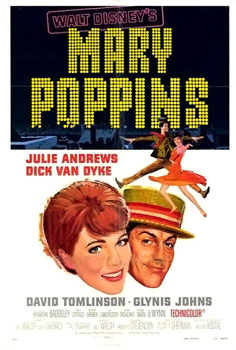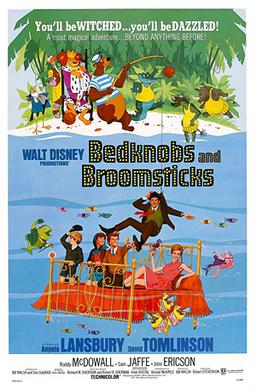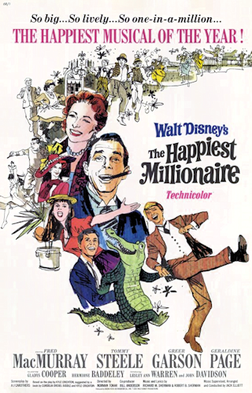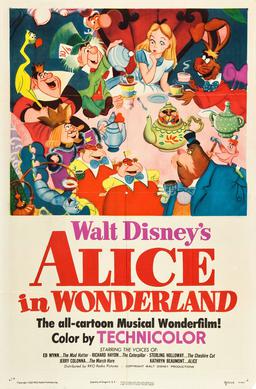
Mary Poppins is a 1964 American musical fantasy comedy film directed by Robert Stevenson and produced by Walt Disney, with songs written and composed by the Sherman Brothers. The screenplay is by Bill Walsh and Don DaGradi, based on P. L. Travers's book series Mary Poppins. The film, which combines live-action and animation, stars Julie Andrews in her feature film debut as Mary Poppins, who visits a dysfunctional family in London and employs her unique brand of lifestyle to improve the family's dynamic. Dick Van Dyke, David Tomlinson, and Glynis Johns are featured in supporting roles. The film was shot entirely at the Walt Disney Studios in Burbank, California, using painted London background scenes.

The Tigger Movie is a 2000 American animated musical comedy-drama film produced by Walt Disney Television Animation with animation production by Walt Disney Animation (Japan), Inc., written and directed by Jun Falkenstein from a story by Eddie Guzelian, and released by Walt Disney Pictures on February 11, 2000. It is the second theatrical Winnie the Pooh film after The Many Adventures of Winnie the Pooh and features Pooh's sidekick Tigger as the main protagonist searching for his family tree and other Tiggers like himself. The film was the first feature-length theatrical Pooh film that was not a collection of previously released shorts.

Buddy Ebsen, also known as Frank "Buddy" Ebsen, was an American actor and dancer, whose career spanned seven decades. One of his most famous roles was as Jed Clampett in the CBS television sitcom The Beverly Hillbillies (1962–1971); afterwards he starred as the title character in the television detective drama Barnaby Jones (1973–1980).

Bedknobs and Broomsticks is a 1971 American musical fantasy film directed by Robert Stevenson and songs written by the Sherman Brothers. It was produced by Bill Walsh for Walt Disney Productions. It is based upon the books The Magic Bedknob (1943) and Bonfires and Broomsticks (1947) by English children's author Mary Norton. The film, which combines live action and animation, stars Angela Lansbury, David Tomlinson, Ian Weighill, Cindy O'Callaghan, and Roy Snart.

The Happiest Millionaire is a 1967 American musical film starring Fred MacMurray, based upon the true story of Philadelphia millionaire Anthony Drexel Biddle. The film, featuring music by the Sherman Brothers, was nominated for an Academy Award for Best Costume Design by Bill Thomas. The screenplay by A. J. Carothers was adapted from the play, based on the book My Philadelphia Father by Cordelia Drexel Biddle. Walt Disney acquired the rights to the play in the early 1960s. The film was the last live-action musical film to be produced by Disney before his death on December 15, 1966.

The Sherman Brothers were an American songwriting duo that specialized in musical films, made up of brothers Robert B. Sherman and Richard M. Sherman. Together they received various accolades including two Academy Awards and three Grammy Awards. They received nominations for a Laurence Olivier Award, a BAFTA Award, and five Golden Globe Awards. In 1976, they received a star on the Hollywood Walk of Fame, and the National Medal of the Arts in 2008.

The Jungle Book is a 1967 American animated musical comedy film produced by Walt Disney Productions and released by Buena Vista Distribution. Based very loosely on the "Mowgli" stories from Rudyard Kipling's 1894 book of the same title, it is the final animated feature film to be produced by Walt Disney, who died during its production. It was directed by Wolfgang Reitherman and written by Larry Clemmons, Ralph Wright, Ken Anderson, and Vance Gerry. Featuring the voices of Phil Harris, Sebastian Cabot, Louis Prima, George Sanders, Sterling Holloway, J. Pat O'Malley, and Bruce Reitherman, the film's plot follows Mowgli, a feral child raised in the Indian jungle by wolves, as his friends, Bagheera the panther and Baloo the bear, try to convince him to leave the jungle before the ruthless tiger Shere Khan arrives.

Alice in Wonderland is a 1951 American animated musical fantasy comedy film produced by Walt Disney Productions and released by RKO Radio Pictures. It is based on Lewis Carroll's 1865 novel Alice's Adventures in Wonderland and its 1871 sequel Through the Looking-Glass. The production was supervised by Ben Sharpsteen, and was directed by Clyde Geronimi, Wilfred Jackson, and Hamilton Luske. With the voices of Kathryn Beaumont, Ed Wynn, Richard Haydn, Sterling Holloway, Jerry Colonna, Verna Felton, J. Pat O'Malley, Bill Thompson, and Heather Angel, the film follows a young girl Alice who falls down a rabbit hole to enter a nonsensical world Wonderland that is ruled by the Queen of Hearts, while encountering strange creatures, including the Mad Hatter and the Cheshire Cat.

Richard Morton Sherman is an American songwriter who specialized in musical films with his brother Robert B. Sherman. According to the official Walt Disney Company website and independent fact checkers, "the Sherman Brothers were responsible for more motion picture musical song scores than any other songwriting team in film history."

Robert Bernard Sherman was an American songwriter, best known for his work in musical films with his brother, Richard M. Sherman. The Sherman brothers produced more motion picture song scores than any other songwriting team in film history. Some of their songs were incorporated into live action and animation musical films including Mary Poppins, The Happiest Millionaire, The The Sword in the Stone, The Jungle Book, The Many Adventures of Winnie the Pooh, Chitty Chitty Bang Bang, The Slipper and the Rose, and Charlotte's Web. Their best-known work is "It's a Small World " possibly the most-performed song in history.
Walt Disney Records is an American record label of the Disney Music Group. The label releases soundtrack albums from The Walt Disney Company's motion picture studios, television series, theme parks, and traditional studio albums produced by its roster of pop, teen pop, and country artists.

Lesley Ann Warren is an American actress, singer and dancer.

The Many Adventures of Winnie the Pooh is a 1977 American animated musical anthology comedy film produced by Walt Disney Productions and distributed by Buena Vista Distribution. It was first released on a double bill with The Littlest Horse Thieves on March 11, 1977.

A Symposium on Popular Songs is a special cartoon featurette made by Walt Disney Productions in 1962. It features songs that were written by the Sherman Brothers, with music arrangements by Tutti Camarata. The Shermans also co-wrote the screenplay but are not credited for this. Host Ludwig Von Drake invites his audience into his mansion where he tells all about popular music through the years, introducing several songs illustrated with stop-motion photography. The film was nominated for an Academy Award for Best Animated Short Film.

Norman Tokar was an American director, actor and occasionally writer and producer of serial television and feature films, who directed many of the early episodes of Leave it to Beaver, and found his greatest success directing over a dozen films for Walt Disney Productions, spanning the 1950s to the 1970s.

Never a Dull Moment is a 1968 American heist comedy crime film from Walt Disney Productions starring Dick Van Dyke and Edward G. Robinson and directed by Jerry Paris. The script by A. J. Carothers was based on The Reluctant Assassin by John Godey. The supporting cast features Dorothy Provine, Henry Silva, Slim Pickens and Jack Elam. Master cartoonist Floyd Gottfredson created a comic strip, Astro Pooch, to be used as a prop in the film.
"I Wan'na Be Like You (The Monkey Song)" is a song from Walt Disney's 1967 film The Jungle Book. The song was written by songwriters Robert and Richard Sherman, and was performed by singer and musician Louis Prima as King Louie, with Phil Harris providing additional vocals as Baloo the bear.
"Trust in Me (The Python's Song)" is a song in the popular Walt Disney film The Jungle Book, from 1967. The song was sung by Sterling Holloway playing the part of Kaa, the snake. The song was written by Disney staff songwriters Robert and Richard Sherman. In the song, Kaa quickly hypnotizes Mowgli into a calm, soothing, relaxing trance, sending Mowgli sleepwalking along his body until he finally coils himself around Mowgli just like he did before. As the song concludes, Kaa readies himself to devour the boy, only to be stopped by Shere Khan the tiger in his search for Mowgli.
"On a Little Bamboo Bridge" was a hit song in 1937 for iconic band leader Louis Armstrong. Music and Lyrics were written by Al Sherman and Archie Fletcher who were frequent collaborators. The copyright is held by Joe Morris Music Company, Incorporated.

Mary Poppins: Original Cast Soundtrack is the soundtrack album of the 1964 film Mary Poppins, with music and lyrics written by songwriters Richard M. Sherman and Robert B. Sherman, and adapted and conducted by Irwin Kostal.
















